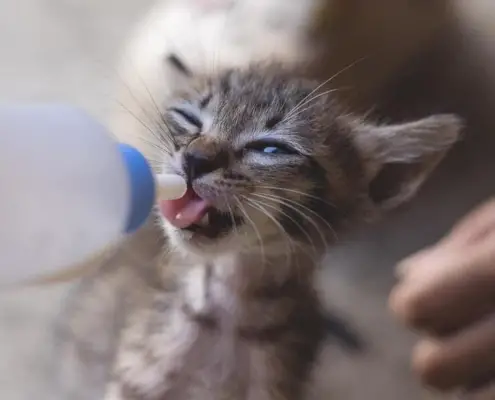
Cancer is a devastating disease that affects not only humans but also our beloved feline companions. As cat owners, it is crucial to understand the causes, symptoms, and treatment options for cancer in cats to provide them with the best care possible. This article aims to shed light on this topic and offer valuable insights for cat owners facing this challenging situation.
Common types of cancer in cats
Cancer can manifest in various forms in cats, with some types being more prevalent than others. The most frequent types of cancer in cats include lymphoma, squamous cell carcinoma, mammary gland tumors, and fibrosarcoma. Lymphoma, a cancer of the lymphatic system, is particularly common in cats and can affect various organs, including the gastrointestinal tract, liver, and spleen. Squamous cell carcinoma often affects the skin, while mammary gland tumors predominantly occur in female cats. Fibrosarcoma typically develops at the site of previous injections or surgeries.
Causes and risk factors of cancer in cats
The exact causes of cancer in cats are not yet fully understood, but certain risk factors have been identified. Exposure to environmental toxins, such as secondhand smoke, household chemicals, and pesticides, can increase the likelihood of cancer development in cats. Additionally, viruses like feline leukemia virus (FeLV) and feline immunodeficiency virus (FIV) have been linked to the development of certain types of cancer. It is essential to minimize exposure to these risk factors to reduce the chances of cancer in our feline companions.
Signs and symptoms of cancer in cats
Recognizing the signs and symptoms of cancer in cats is vital for early detection and treatment. Some common indicators include unexplained weight loss, loss of appetite, changes in behavior, abnormal lumps or swelling, difficulty breathing, vomiting, diarrhea, and abnormal discharge from the nose, mouth, or anus. Cats may also exhibit signs of pain, such as reluctance to move or sensitivity to touch. If you notice any of these symptoms in your furry friend, it is crucial to consult a veterinarian promptly.
Diagnosing cancer in cats
Diagnosing cancer in cats involves a combination of physical examinations, laboratory tests, and imaging techniques. The veterinarian will perform a thorough examination, feeling for abnormal lumps or enlarged organs. Blood tests can help detect any abnormalities or imbalances that may indicate cancer. Imaging techniques, such as X-rays, ultrasound, or MRI, may be used to visualize internal organs and identify potential tumors. In some cases, a biopsy may be necessary to confirm the presence of cancer cells.
Treatment options for cancer in cats
The treatment options for cancer in cats depend on various factors, including the type and stage of cancer, as well as the overall health of the cat. Common treatment modalities include surgery, chemotherapy, radiation therapy, and immunotherapy. Surgery is often the primary approach for removing localized tumors. Chemotherapy and radiation therapy are used to target cancer cells that may have spread beyond the primary tumor. Immunotherapy aims to stimulate the immune system to recognize and attack cancer cells. The veterinarian will develop a treatment plan tailored to the specific needs of your cat.
Palliative care for cats with cancer
Palliative care plays a significant role in improving the quality of life for cats with cancer. This approach focuses on providing relief from pain and discomfort associated with the disease. Pain management medications, such as nonsteroidal anti-inflammatory drugs (NSAIDs) and opioids, may be prescribed to alleviate pain. Additionally, dietary modifications and supplements can support the overall well-being of the cat. Regular veterinary check-ups and open communication with the veterinarian are crucial during this stage to ensure the cat’s comfort and well-being.
Preventing cancer in cats
While it may not always be possible to prevent cancer in cats, there are steps cat owners can take to reduce the risk. Keeping cats indoors minimizes their exposure to environmental toxins and potential infectious agents. Providing a balanced diet with high-quality cat food can support their overall health and immune system. Regular veterinary check-ups and vaccinations are essential for early detection and prevention of certain types of cancer. Lastly, avoiding exposure to secondhand smoke and other harmful substances can significantly reduce the risk of cancer in cats.
Support and resources for cat owners dealing with cancer
Coping with a cancer diagnosis in a beloved cat can be emotionally challenging. It is important for cat owners to seek support and resources to navigate through this difficult time. Online forums and support groups specifically for cat owners dealing with cancer can provide a sense of community and valuable advice. Veterinary oncologists and specialized cancer centers can offer advanced treatment options and guidance. Additionally, speaking openly with friends, family, and the veterinary team can provide emotional support and help make informed decisions regarding the cat’s care.
Providing the best care for cats with cancer
Understanding cancer in cats is crucial for providing the best possible care for our feline companions. By recognizing the common types, causes, and symptoms of cancer, cat owners can seek prompt veterinary attention and increase the chances of successful treatment. Through early diagnosis, appropriate treatment options, and palliative care, we can improve the quality of life for cats with cancer. By taking preventive measures and seeking support from resources available, cat owners can navigate through this challenging journey and ensure their furry friends receive the love and care they deserve.
If you enjoyed my article, I would appreciate you sharing it with your network.

Sima Ndlebe
Sima writes for CatBuzz. He is interested in Cats, Health and Fitness, and Entrepreneurship.
Published: 12 October 2023
Related Articles
Disclaimer
The content found on CatBuzz.org is presented on an "as is" basis and is intended for general consumer information and education purposes only. Any utilization of this information is voluntary and solely at the user's own risk.
None of the articles or content should be regarded as, or used in place of, veterinary medical advice, diagnosis, or treatment. The information provided on the website is purely for educational and informational intentions and should not be considered a substitute for professional guidance from a veterinarian or other qualified expert. The articles are designed to inform consumers about veterinary healthcare and medical matters that may impact their cat's daily life. It should be noted that this website and its services do not constitute the practice of any form of veterinary medical advice, diagnosis, or treatment. CatBuzz.org explicitly disclaims any liability for any direct or indirect damages or losses that may arise from the use of or reliance on the information contained within the content.
Consumers must consult a veterinarian, veterinary specialist, or another qualified veterinary healthcare provider when seeking advice regarding their cat's health or medical conditions. It is important not to ignore, avoid, or postpone seeking medical advice from a veterinarian or other qualified veterinary healthcare provider solely based on information obtained from this website. If you believe that your cat may be experiencing a medical issue or condition, it is imperative to promptly contact a qualified veterinary healthcare professional.




